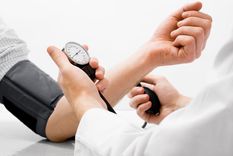
What are the first signs of bowel cancer?
Bowel cancer, also known as colon or colorectal cancer, is the fourth most common cancer in the UK and the second leading cause of cancer-related deaths. Yet, despite its prevalence, early signs often go unnoticed. This is because symptoms can be subtle, easily mistaken for less serious conditions or simply absent in the early stages.
Recognising the first signs of bowel cancer is key to catching it early, when treatment is most effective. In this article, we’ll explore the early symptoms to be aware of, how to distinguish them from everyday digestive issues and what steps you can take if you’re concerned.
Why early detection matters
Bowel cancer usually develops slowly over several years. It often begins as non-cancerous polyp - small growths in the lining of the bowel - which can become cancerous if not removed. Catching these changes early through screening or by identifying symptoms significantly improves the chance of successful treatment.
According to Cancer Research UK, more than 90% of people with bowel cancer will survive for five years or more if the disease is diagnosed at its earliest stage. But that figure drops significantly as the cancer advances. This makes awareness and timely action crucial.
What are the first signs of bowel cancer?
Early bowel cancer can be difficult to detect because symptoms may be vague or mild. However, there are a few telltale signs that you shouldn’t ignore, particularly if they persist for several weeks.
1. Changes in bowel habits
One of the most common early signs is a noticeable change in your usual bowel movements. This could include:
-
Persistent diarrhea or constipation
-
A change in stool consistency (looser or harder than usual)
-
Going to the toilet more or less often than normal
-
Feeling like you haven’t fully emptied your bowels
These changes are often dismissed or attributed to diet, stress or a stomach bug, but if they last longer than three weeks, it’s important to get checked.
2. Blood in your stool
Finding blood in your poo or on the toilet paper can be alarming. In bowel cancer, bleeding is often caused by tumours irritating the bowel lining. It may appear as:
-
Bright red blood (typically from the lower bowel or rectum)
-
Dark or black, tar-like stools (which can indicate bleeding higher up the colon)
While blood in the stool can also be caused by piles (haemorrhoids), it should never be ignored, especially if it’s accompanied by other symptoms.
3. Unexplained weight loss
Losing weight without trying can be a red flag for several health conditions, including cancer. In bowel cancer, weight loss may be due to the body's immune response to the tumour or changes in how your body absorbs nutrients.
If you’ve lost weight unintentionally over a short period of time, especially in combination with other digestive symptoms, it’s worth speaking to your doctor.
4. Persistent abdominal discomfort
A growing tumour in the bowel can cause cramping, bloating or pain in the stomach. You might notice:
-
A general feeling of discomfort or fullness
-
Pain after eating
-
Excess gas or bloating
These symptoms are commonly linked to conditions like irritable bowel syndrome, but if they’re new, worsening or lasting more than a few weeks, they should be investigated.
5. Fatigue and weakness
Ongoing tiredness, even after a full night’s sleep, can be another early warning sign. Bowel cancer can cause chronic internal bleeding, leading to iron deficiency and anaemia, both of which reduce your red blood cell count and cause fatigue.
Other symptoms of anaemia can include pale skin, breathlessness and dizziness.
When to see a doctor
It’s important to remember that most of these symptoms are not caused by cancer. However, that doesn’t mean they should be ignored. You should speak to a healthcare professional if you:
-
Notice a change in your bowel habits lasting more than three weeks
-
See blood in your stool without an obvious cause
-
Experience ongoing abdominal discomfort
-
Are feeling increasingly tired without explanation
-
Lose weight unintentionally
Even if you're unsure, getting checked is always better than waiting. Early diagnosis could make a life-saving difference.
Who is more likely to notice symptoms?
While bowel cancer can affect anyone, it’s more common in people over 50. However, younger people are not immune. In fact, rates in under-50s have been rising in recent years, which is why it’s so important to pay attention to symptoms, regardless of your age.
You may be more likely to notice signs early if you:
-
Are aware of your bowel habits and changes
-
Have a family history of bowel cancer
-
Have pre-existing conditions like Crohn’s disease or ulcerative colitis
-
Take part in regular screening programs
Being informed and proactive about your health can help you catch symptoms earlier and seek support faster.
What happens next?
If your doctor suspects bowel cancer, they may arrange further tests, such as:
-
A Faecal Immunochemical Test (FIT) to check for hidden blood in your stool
-
A colonoscopy to visually examine the inside of your bowel and remove any suspicious polyps
-
A CT colonography is a less invasive scan that provides images of the bowel
If anything abnormal is found, samples may be taken for biopsy. But remember: early testing doesn’t mean a cancer diagnosis - it means ruling out issues and potentially catching a problem before it becomes serious.
Can I reduce my risk of bowel cancer?
While some risk factors for bowel cancer (such as age or family history) are outside your control, many can be managed through lifestyle changes. These include:
-
Eating a high-fibre, balanced diet – including whole grains, fruits and vegetables
-
Limiting processed and red meats
-
Staying physically active – aim for at least 150 minutes of moderate activity a week
-
Maintaining a healthy weight
-
Not smoking
-
Limiting alcohol intake
Perhaps the most powerful step you can take is to get screened. Whether you’re eligible for NHS screening or prefer a private health check, testing helps detect problems before symptoms even appear.
Take control of your bowel health with Bluecrest Wellness
If you’re concerned about bowel cancer symptoms or want to check your risk, a private health assessment can offer clarity and peace of mind. At Bluecrest Wellness, our comprehensive health checks include a wide range of screenings for digestive, cardiovascular, and overall wellbeing. The AFIT test for bowel cancer is included in our cancer screening package and can also be added to any of our other health assessments.
All assessments include:
-
A detailed Results Report
-
Free 24/7 GP helpline access for one year
-
Flexible booking at over locations across the UK
-
Tests for blood pressure, cholesterol, diabetes risk and more
Protect your bowel health now and enjoy the confidence that comes with early awareness.
Need help? Call free on
0800 652 2183 to speak to one of our team.

Anna Jones
Chief Nursing Officer, Bluecrest
Dr Martin Thornton
Chief Medical Officer, Bluecrest

















